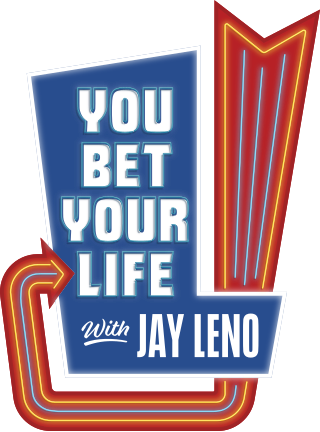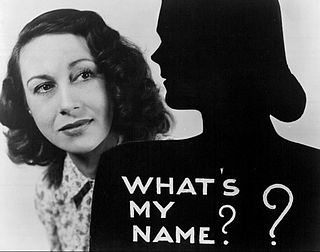Related Research Articles

The 1950s quiz show scandals were a series of scandals involving the producers and contestants of several popular American television quiz shows. These shows' producers secretly gave assistance to certain contestants in order to prearrange the shows' outcomes while still attempting to deceive the public into believing that these shows were objective and fair competitions. Producers fixed the shows sometimes with the free consent of contestants and out of various motives: improving ratings, greed, and the lack of regulations prohibiting such conspiracy in game show productions.

The $64,000 Question is an American game show broadcast in primetime on CBS-TV from 1955 to 1958, which became embroiled in the 1950s quiz show scandals. Contestants answered general knowledge questions, earning money which doubled as the questions became more difficult. The final question had a top prize of $64,000, hence the "$64,000 Question" in the show's title.

Blockbusters is a British television quiz show based upon an American quiz show of the same name. A solo player and a team of two answer trivia questions, clued up with an initial letter of the answer, to complete a path across or down a game board of hexagons.
CBS Television Quiz is an American game show, running from July 2, 1941, to January 7, 1943, on the CBS television station in New York, WCBW Channel 2. It was the first game show to be broadcast regularly on television. It was an in-house production and broadcast in black-and-white. The host was Gil Fates, with Frances Buss as scorekeeper.

You Bet Your Life is an American comedy quiz series that has aired on both radio and television. The original version was hosted by Groucho Marx of the Marx Brothers, with announcer and sidekick George Fenneman. The show debuted on ABC Radio on October 27, 1947, moved to CBS Radio debuting October 5, 1949, and went to NBC-TV and NBC Radio on October 4, 1950. Because of its simple format, it was possible to broadcast the show on both radio and television but not simultaneously. Many of the laughs on the television show were evoked by Groucho's facial reactions and other visual gimmicks. So the two versions were slightly different. The last episode in a radio format aired on June 10, 1960. The series continued on television for another year, recording the last season, beginning on September 22, 1960, with a new title, The Groucho Show.
Information Please is an American radio quiz show, created by Dan Golenpaul, which aired on NBC from May 17, 1938, to April 22, 1951. The title was the contemporary phrase used to request from telephone operators what was then called "information" and later called "directory assistance".

Quiz Kids is a radio and TV series originally broadcast in the 1940s and 1950s. Created by Chicago public relations and advertising man Louis G. Cowan, and originally sponsored by Alka-Seltzer, the series was first broadcast on NBC from Chicago, June 28, 1940, airing as a summer replacement show for Alec Templeton Time. It continued on radio for the next 13 years. On television, the show was seen on NBC and CBS from July 6, 1949, to July 5, 1953, with Joe Kelly as quizmaster, and again from January 12 to September 27, 1956, with Clifton Fadiman as host.

Who Do You Trust? is an American television game show.

Strike It Rich is a game show that was broadcast on American radio from June 29, 1947, to December 27, 1957, on CBS and NBC. It was broadcast on television as well, starting in 1951. People in need of money appeared and told their tale of woe, then tried to win money by answering four questions. If the contestant did not win any money, the emcee opened the "Heart Line", which was a phone line to viewers who wished to donate to the contestant's family.
Break the Bank is an American quiz show which aired variously – and sometimes co-existed in separate radio and television forms – on Mutual Radio, ABC Radio and NBC Radio Network, as well ABC, CBS and NBC television, from 1945 to 1957. From October 1956 to January 1957, NBC aired a short-lived prime-time television version called Break the $250,000 Bank.

Beat the Band is a musical quiz show heard on NBC radio from 1940 to 1944 in two distinctly different series. The program popularized the show business catch phrase, "Give me a little traveling music", often uttered on TV a decade later by Jackie Gleason.

George Ansbro was a radio announcer for NBC and ABC for six decades, working with soap operas, big bands, quiz shows and other programs.
Americana is a weekly game show which ran on NBC from December 8, 1947, to July 4, 1949.
Take It or Leave It is a radio quiz show, which ran from April 21, 1940, to July 27, 1947, on CBS. It switched to NBC radio in 1947, and on September 10, 1950, the name of the program was changed to The $64 Question.

What's My Name? was a 30-minute radio program in the United States. The program was hosted by Arlene Francis and was among the first radio shows to offer cash prizes to contestants.

Kay Kyser's Kollege of Musical Knowledge is an American old-time radio musical quiz program starring Kay Kyser. It was broadcast on Mutual, NBC, and ABC beginning on February 1, 1938, and ending on July 29, 1949.
This Is Show Business is an American variety television program that was broadcast first on CBS and later on NBC beginning July 15, 1949, and ending September 11, 1956. It was CBS-TV's first regular series broadcast live from coast to coast. It was originally titled This Is Broadway.
Saturday Night Review is a live American variety television series that was broadcast on NBC in 1953 and 1954 as a summer replacement for Your Show of Shows.

Twenty Questions, based on the guessing game Twenty questions, started as a radio quiz show in 1946. The television series ran on NBC in 1949, on ABC from 1950 to 1951 and on the DuMont Television Network from 1951 to 1954.
References
- ↑ Dunning, John (1998). On the Air: The Encyclopedia of Old-Time Radio (Revised ed.). New York, NY: Oxford University Press. p. 663. ISBN 978-0-19-507678-3 . Retrieved November 30, 2024.
- 1 2 "Comment". Billboard. January 3, 1942. p. 8. Retrieved January 6, 2022.
- ↑ "Greyhound on Blue" (PDF). Broadcasting. February 1, 1940. p. 32. Retrieved January 4, 2022.
- 1 2 3 4 "Program Reviews: 'This Amazing America'" (PDF). Billboard. April 6, 1940. p. 7. Retrieved January 5, 2022.
- ↑ "Network Changes" (PDF). Broadcasting. May 15, 1940. p. 93. Retrieved January 5, 2022.
- ↑ "Bus Line Film to Show in Russia" (PDF). Billboard. August 14, 1943. p. 28. Retrieved January 5, 2022.